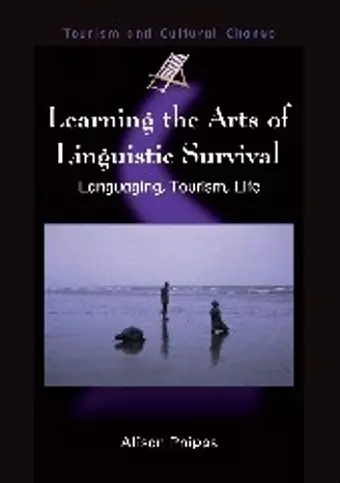Learning the Arts of Linguistic Survival
Languaging, Tourism, Life
Format:Paperback
Publisher:Channel View Publications Ltd
Published:10th Nov '06
Currently unavailable, and unfortunately no date known when it will be back

In this ground-breaking contribution to the study of tourism and languages, Alison Phipps examines what happens when tourists learn to speak other languages. From ordering a coffee to following directions she argues for a new perception of the relationship between tourism and languages from one based on the acquisition of basic, functional skills to one which sustains and even strengthens intercultural dialogue. The twelve chapters comprising this book tell stories of the experience of learning and speaking tourist languages. Drawing on a range of disciplines Alison Phipps takes the reader on a journey through risk, way finding, mistakes, laughter, conversations and the imagination. She provides rich descriptions of the world of language learning which has remained invisible to mainstream studies of language education, existing as it does on the margins of educational life. She shows how tourism is shaped by the learning experiences of everyday life. Languages, she argues passionately, fundamentally change the nature of perception, dwelling and relationships to other people and the world. This book will be essential reading for all those interested in tourism studies and in modern languages education. It is a timely study, coming at time of crisis in languages, as English exerts its power as a world language and as a dominant language of tourism. Learning the Arts of Linguistic Survival: Languaging, Tourism, Life will also be of interest to anthropologists, linguists, geographers, sociologists and those studying education.
Language and difference have always pushed against the boundaries of certainty, authoritarianism, and hope. In this beautifully written, poetic, and brilliantly insightful book, Alison Phipps addresses the social, cultural, and political implications of learning to speak a tourist language and its broader implications for a meaningful sense of dialogue, cultural change, and democracy itself. Moreover, Phipps offers us a new way of understanding learning as a form of public pedagogy that takes place outside traditional sites of learning and in doing so constitutes a pedagogical space rich with the possibilities of desire, agency, and a global cosmopolitanism. This may be one of the most important books written on language, pedagogy, and tourism in the last fifty years and hopefully will be widely read by anyone wishing to enter the changing conditions of a global democracy.
-- Henry Giroux, McMaster University, Canada.This lively book provides an intriguing view of why we still want to learn foreign languages. Others have seen tourism as sounding the death knell for language learning: Phipps takes the opposite view and shows how travel actually motivates ordinary people to try and communicate in a new language. She goes so far as to suggest that tourism may even be the single phenomenon that enables most intercultural encounters for the greates number of people in today's world. I found myself questioning many long-held assumptions after reading Phipps' provocative book.
-- Susan Bassnett, University of Warwick, UKThis is a very unusual book that should be read by an unusually wide audience as it crosses a number of boundaries, and thereby questions comfortable assumptions inherent in many of the disciplines it touches upon. Modern language professionals have tended to look down upon the practices of learning languages for tourism, and yet, Phipps demonstrates, they have much to learn from these. In tourism studies again little attention has been paid to language learning relative to the economic aspects of tourism or the critical focus on the tourist gaze, for example. This is a work of linguistic anthropology or 'auto-anthropology' as Phipps puts it which focuses on the self as guest (who is trying to be a good guest), rather than the self as host, through 'languaging'. Phipps's original take, and lively prose, as well as her commitment to her subject, make this a really good read which should shake us language professionals out of some of our dearly-held prejudices!
-- Judith Still, University of Nottingham, UKThis book is worth reading for reasons of content, style, and mode of research. In concert with other publications in the series, such as Tourism and Intercultural Change: Why Tourism Matters, it is passionately written, electrifying, and insightful. The book is recommended for all interested in the complex relationship between tourism, language, intercultural dialogue, and human interaction.
-- Melani Nekic * KULT Online Issue 19 (2009) *Alison Phipps has written a thought-provoking and unusual book, which deserves to be read by tourism academics and, perhaps even more so, by those in mainstream language education who are struggling to keep their discipline alive.
-- Frances Brown * Tourism Recreation Research 34(1) 2009 *Alison Phipps' Learning the Arts of Linguistic Survival is an inspiring, intellectually and morally provocative book, which is nothing short of a state of the art of theorizing tourism and tourists from a language-sensitive or language-oriented perspective. Phipps offers a view of tourists that is rare and refreshing, and builds on well grounded approaches, which, in my mind, can be generally labelled “post-structural.” Through applying these dynamic and critical perspectives, and not taking anything for granted, Phipps attends to the seemingly ordinary spheres of tourism, and to where the extraordinariness of tourism meets the ordinariness of everyday lives. This juxtaposing—of tourism and everydayness—turns out to be remarkable, because it shows how rather interesting and worthy are everyday lives of some people. In other words, through researching tourists, we gain a contribution to what might we might call the “contemporary human condition,” over and above the contribution to “tourism scholarship.”
-- Chaim Noy, The Hebrew University of Jerusalem * Tourism Review InternationISBN: 9781845410537
Dimensions: 210mm x 148mm x 12mm
Weight: 294g
216 pages